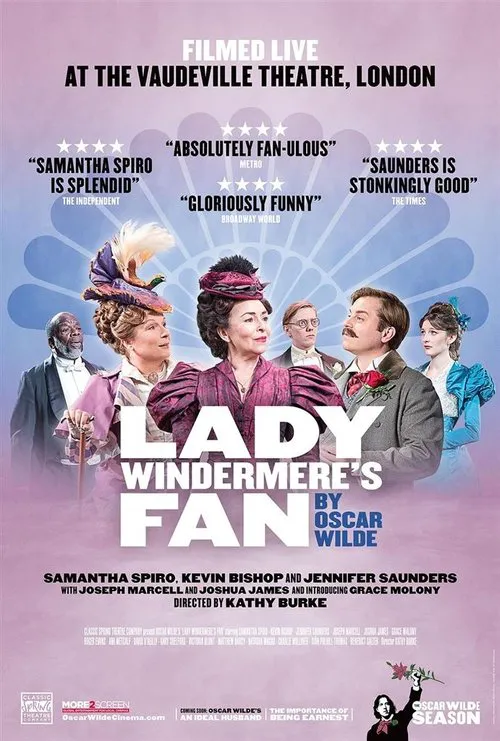Lady Windermere's Fan

Plot
In Oscar Wilde's 1892 masterpiece, Lady Windermere's Fan, Lady Windermere stands at the threshold of her birthday party, radiating an air of serenity and perfection. The setting, an opulent Victorian townhouse, is abuzz with the crème de la crème of high society, all gathered to celebrate this esteemed occasion. On the surface, all appears to be well within the hallowed halls of the Windermere marriage. However, beneath the façade of propriety, a ticking time bomb awaits – and no one is more aware of it than Lord Darlington. The cunning and charming Lord Darlington, a close friend of Lord Windermere, stirs the waters of suspicion by innocently planting a seed of doubt in Lady Windermere's mind regarding her husband's fidelity. The query begins: Is Lord Windermere having an affair? And if so, will his paramour, Mrs. Erlynne, actually attend Lady Windermere's party, thus causing a most... delicate situation? Throughout the play, Wilde masterfully weaves a tapestry of witty repartee, razor-sharp observations, and biting social commentary to expose the hypocrisy of the upper class. This tight-rope act of delicacy and duplicity is expertly performed by the aristocracy, who engage in an intricately choreographed dance of lies, concealment, and veiled truth. Lady Windermere, an embodiment of the restrictive yet revered Victorian ladies, finds herself caught in the crossfire of social expectations. Her situation is precarious, and her actions are carefully calibrated to maintain the semblance of perfection. In an era where marriage is viewed as a business arrangement, Lady Windermere's status is tenuous, dependent on her husband's status and the approval of the community. Any hint of scandal threatens not only her self-respect but also her standing within the social hierarchy. In this oppressive atmosphere, the tension builds, and as the evening of the party approaches, it becomes clear that Lady Windermere's fan, a token passed down through generations, serves as a beacon for her vulnerability. As a symbol of tradition and a reminder of her position within the social order, the fan holds a profound significance for Lady Windermere. However, it also signifies her fragility, as her status in society hangs precariously in the balance. Wilde skillfully introduces a series of complex characters, each with their own agenda and motivations. Mrs. Erlynne, the enigmatic and resourceful widow, serves as the wild card, defying conventions with her candor and determination. Meanwhile, the effete but shrewd Lord Darlington, as the narrator and catalyst of events, observes the unfolding drama with a knowing smile, often providing biting asides and trenchant commentary on the society he inhabits. As the truth about Lord Windermere's alleged infidelity comes to light, Wilde mercilessly exposes the hypocrisy and moral laxity of upper-class society. Beneath the carefully constructed veneer of respectability lies an ocean of secrets, deceit, and corruption. The party, initially planned to celebrate Lady Windermere's virtues, gradually descends into chaos, revealing the underlying fragility of the social edifice. Through his witty dialogue and biting satire, Wilde masterfully exposes the artificial constructs of the aristocracy and the suffocating constraints placed upon women. This clever subversion of expectations culminates in a dramatic denouement, one that ultimately rewrites the rules of Lady Windermere's world and redefines her position within it. As the curtain falls, it becomes clear that Lady Windermere's fan has served its purpose, symbolizing not only her vulnerability but also her newfound understanding of her own agency and worth. Wilde's triumph in Lady Windermere's Fan lies in his clever subversion of societal norms, exposing the cracks in the facade of upper-class morality and revealing the intricate web of secrets, lies, and deception that underpins it.
Reviews
Recommendations



